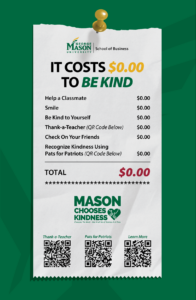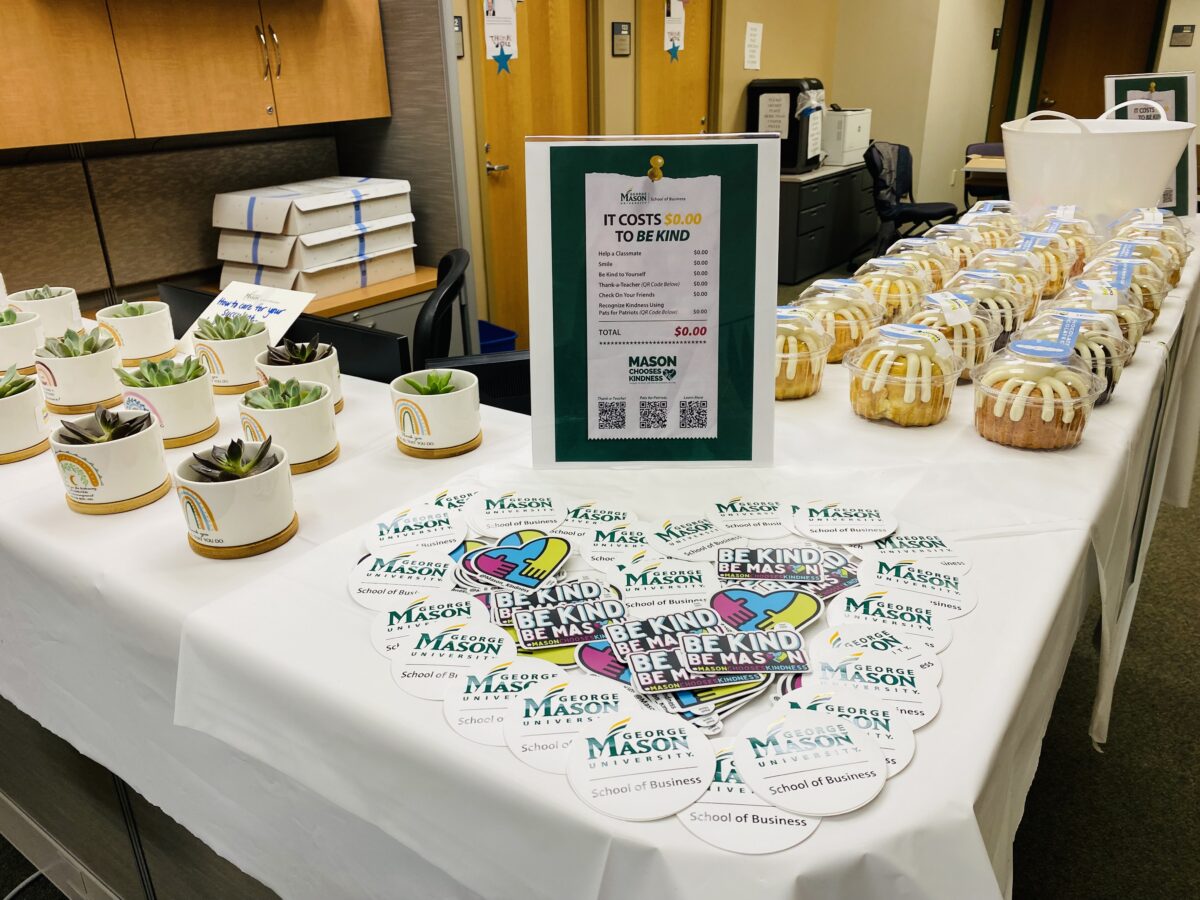By: Christine Landoll, Professor of Practice, Costello College of Business (formerly the School of Business); Gretchen Hendricks, Senior Instructor, Costello College of Business; Jacquelyn Brown, Senior Instructor and Chair of Business Foundations, Costello College of Business; and Haley White, Student Employee, Costello College of Business
“Remember there’s no such thing as a small act of kindness. Every act creates a ripple with no logical end.” – Scott Adams, “Dilbert” Creator and Author
You can read a million articles on what it takes to impact productivity and other positive outcomes in the workplace and see that many of them come back to positive relationships with your boss. Yet a Harvard Business Review survey reveals that 58 percent of people say that they trust strangers more than their own bosses. At the Costello College of Business, we see this as a call to action. We are working to create and nurture the leaders of tomorrow, and one way we are exploring this is through kindness. Kindness? Isn’t that too fluffy? Actually, kindness is just the opposite of fluffy – it is linked to real outcomes that impact business. Here are key well-being benefits of kindness in the workplace, and how you can foster kindness in your own workplace.
The Benefits of Kindness at Work
“Kindness is the new currency,” this Inc. article points out. People are increasingly seeing the value kindness brings to every corner of an organization. The U.S. Chamber of Commerce collaborated with the Born This Way Foundation to launch a campaign with a focus on kindness as “an important business principle and [to] share the business case for kindness.” What a case it is!
Years of research highlighted in this Harvard Business Review article have consistently shown that kindness, like recognition at work, “reduces employee burnout and absenteeism, improves well-being, increases positive emotions, and helps life feel more meaningful.” Often, many of the outcomes of kindness are linked to other important outcomes, such as long-term satisfaction at work and decreased turnover rates, which in turn impact profit, this Forbes article shows. Kindness improves our physical health as well, and healthier employees lower healthcare costs, according to this Mayo Clinic Healthcare System article. The consequences of kindness are far-reaching, and research around this topic is growing as it becomes a priority for businesses of the future.
People also want to work in places that value kindness and mental health. In fact, in a recent survey commissioned by Kindness.org, 89 percent of workers saw these as “high priorities in the workplace.” Young people, especially, believe that leaders have the responsibility to foster kindness, according to this recent Born This Way Foundation Kindness in the Workplace report. They set the precedent, and people look to them to learn about company culture. Leader qualities such as flexibility and risk-taking are valuable, but it’s time to emphasize kindness. This Forbes.com article calls kindness “a seatbelt that keeps you down to earth and connected to the people who matter the most.” In short, kindness drives connection, which drives business outcomes.
How to Foster Kindness in Your Workplace
 How can you foster kindness in your workplace? One strategy we have had success with at the College of Business is setting up kindness stations. These stations can take different forms (such as kindness corners or kindness carts), but they all have the same elements. These include treats like cookies or cakes, snacks, stickers, fidget toys, plants, and other small items. Also included are College of Business posters relating to kindness with QR codes that encourage the community to recognize the kindness of others. At Mason, we can send e-cards to thank colleagues or students for their kindness, through the Pats for Patriots program. Online platforms are a great space to celebrate the kind acts of your coworkers, and physical spaces (such as a gratitude wall) are other good ways to encourage kindness in the workplace.
How can you foster kindness in your workplace? One strategy we have had success with at the College of Business is setting up kindness stations. These stations can take different forms (such as kindness corners or kindness carts), but they all have the same elements. These include treats like cookies or cakes, snacks, stickers, fidget toys, plants, and other small items. Also included are College of Business posters relating to kindness with QR codes that encourage the community to recognize the kindness of others. At Mason, we can send e-cards to thank colleagues or students for their kindness, through the Pats for Patriots program. Online platforms are a great space to celebrate the kind acts of your coworkers, and physical spaces (such as a gratitude wall) are other good ways to encourage kindness in the workplace.
These spaces – whether stationary or portable, online or physical – provide a place for connection and recognition. Embedding kindness in organizations does not require drastic steps. Even something as simple as asking your coworkers how they are doing can make a difference.
Get started today by taking time in a meeting to ask colleagues to nominate a peer for a kind act, and then follow up with a small gift or positive verbal recognition. Don’t let kindness be a stranger in your workplace. Instead, let it be the strategy that drives your organization’s performance and shapes the leaders of the future.
Additional Resources
The Mason Chooses Kindness toolkit includes resources to help you put kindness into action.
The Greater Good Science Center regularly features research on kindness and well-being.
Write one of these Thriving Together Series features! We’re looking for contributions on all topics related to well-being. Read other Thriving Together Series articles here and contact us at [email protected] for guidelines. Thank you for helping our Mason community thrive together online!






















